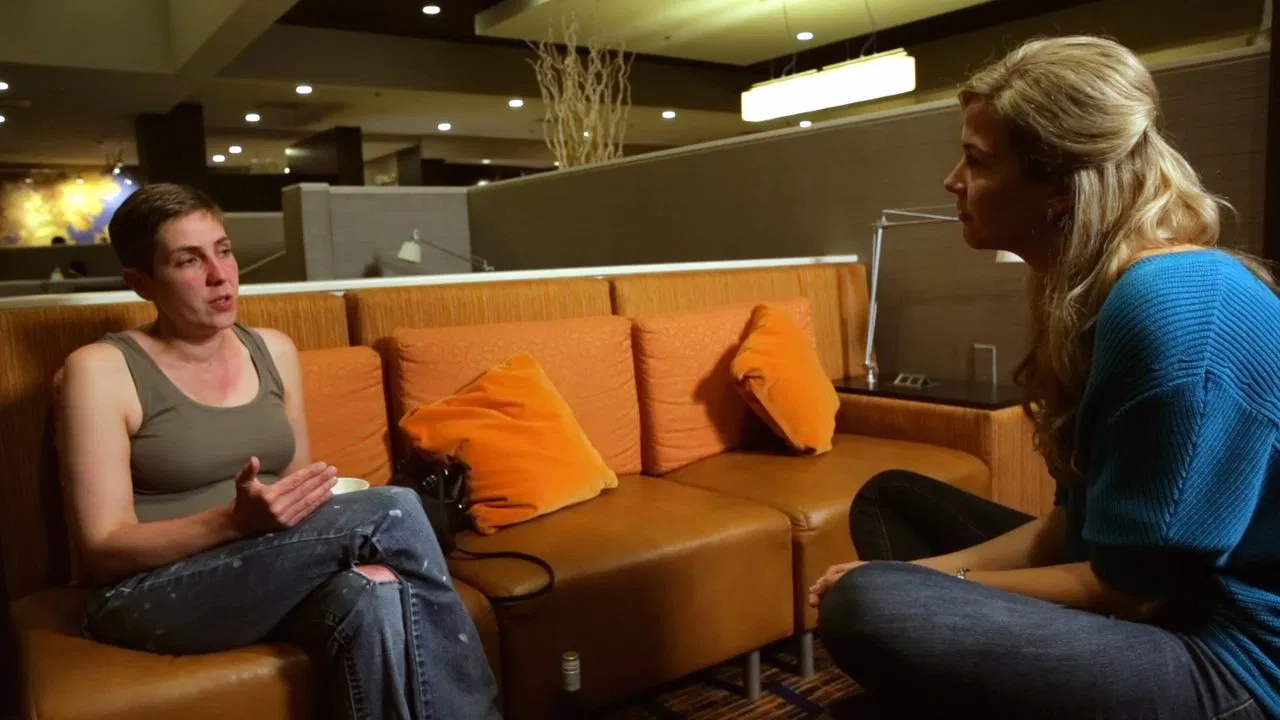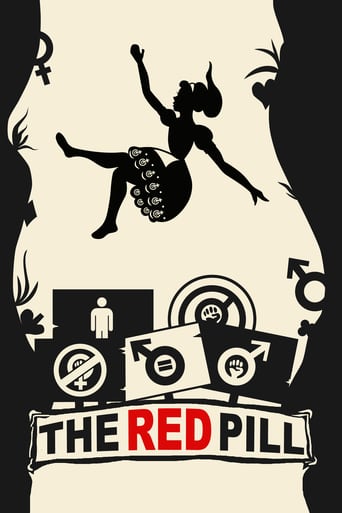

I wanted to cry at the end of this, not because I felt like I had learned anything new, but because it reinforced what I already knew - that sexism is on the rise, especially in young women. The only people that come away from this and feel like their opinion is changed, are people that were influenced by sexist beliefs in the first place. Personally, I had not identified as feminist until recently, but it turns out, I have always been for gender equality. But, because of the labeling of older feminists as "radical feminists", I had felt that that was an insult, and did not want to be considered disagreeable. Younger people now do not understand that "radical feminist" is not a new insult. That was what killed the movement in the 1980s when the ERA failed to pass, which is now only having a "second wave" due to current politics. Men's rights are not a backlash to feminism - they are hijacking it. It is an inside job. The last argument focuses on circumcision, but what the narrator doesn't seem to understand is that it was the same people in the 1970s that fought for sexual and racial equality, that also fought against things like circumcision. And the women's movement has never claimed that there aren't victims and perpetrators on both sides - that is the opposite of what it claims, since it posits that men and women are equal (and therefore equally capable of being good and bad). While thought provoking, I find that this documentary impassions where feminists already had compassion. The fact that the filmmaker didn't know about these issues is what really terrifies me. Women WANT to dig ditches, we WANT to fight and die in wars. We don't want to be the first person off the boat. And we certainly don't want to coddle men's emotions, just as we don't want women to be coddled. But, you will find that while some men are saying that women have it better than men, they are predominately the same people fighting to keep things the way they are (while not necessarily the men in this film). I think what we see here is an example of men taking their own individual experiences, in which they were negatively effected by a woman or sexism in general, and they are incorrectly extrapolating it to mean that feminism overall is bad. The fact that it does not address benevolent sexism is also troubling (when men treat women as if they are in need of protection). In other words, it focuses on the plight of men suffering for the sacrifice of protecting women, but it fails to expand on why that mentality is bad for women, too (it weakens their social power outside of the context of war and labor, which justifies inequality). Men who demonstrate benevolent sexism are also more likely to demonstrate hostile sexism - the type that we are familiar with, because the two things are related. Those of us who truly understand what sexism is, have always known that the pedestal which women are placed on is in fact imaginary, and men choose to continue making sacrifices (like fighting in wars), because it reinforces their superiority as humans. Real feminists want the opportunity to die for a cause - they want to be able to say they earned their privilege. Because the driving force of human behavior is to do something good for others and to have value in society, even as a ditch digger. It is a privilege to say that you are the breadwinner, and that you did the work. Anti-feminists, like the woman in this film, fail to acknowledge that unfair privilege is harmful to men, by treating them as inferior in a way, needing an unfair advantage, and to be lied to about their true value. The fact that the girls kidnapped by Boko Haram was so publicized is also an example of benevolent sexism, where significant attention was given because of the underlying belief that women are more vulnerable and needing protection. THAT is sexism, not the fact that so many boys were killed, too, which is of course a grave tragedy, and no true feminist would ever say that it wasn't. So, instead of abandoning the idea of feminism as sexual equality for all, why not just acknowledge that you never truly understood it to begin with?
... View MoreCassie Jaye made a very deep, and a vert thinking-loaded documentary about men's rights. I have never known much of what she described in her movie, but the facts are clear-cut, logically arranged, effectively presented, stunningly honest and very decent. Feminism is a very large thing and it's not an easy deal to grasp it at one gulp. Same as MRA. Men's Rughts are described here at full, and very interesting facts are presebted well and sincerely. Casey had a mind-changing trip. So have we. If you watch this, take patience, as it is a lonf, 120 minutes, slow-pacing, serious movie with tons of dialog, but it does deliver the message. Both sides are vulnerable and suffering. Great watch for those who are willing to study the issue deeper
... View MoreI remember, years ago, before everybody started talking about "mansplaining" and "male privilege", I was at university studying social work, minoring in gender studies. I repeatedly came across the statement made by feminists - kind of an official codicil at the end of their magna cartas - that said they were okay with men starting groups of their own, to work on men's issues.Even in those dark days, I didn't believe it. What we have seen in recent years with the concomitant rise of "MRAs" (Men's Rights Activists) as feminism entered the mainstream, is that that line at the end of feminist treaties was a bald-faced lie. Men try to hold meetings to discuss their issues, women try to shut them down. Female protestors verbally and physically attack anyone who tries to enter talks by proponents of Men's Rights such as Janice Fiamengo and Karen Straughan. Their war-cries drown out the reasonable speeches made by the speakers. Illegally, they pull fire alarms, and make threats of violence to the owners of any venue who will allow MRAs to speak.This is all documented in "The Red Pill", a shocking, infuriating, at times heart-breaking documentary that was - surprise surprise - protested, shut down, and ultimately ignored by the media.At one point, Professor Fiamengo asks her protestors why they are so terrified of hearing an opinion different to their own. The answer seems to be that these people are allergic to facts. They avoid them like the plague. They attempt to stop them being spoken - to anyone - in the first place. And when they hear them, they go crazy. Footage of the charming feminist protestor "Big Red" doesn't do a whole lot to dissuade people from the notion that feminists are unhinged. This brings us to another bizarre fact about many feminists: they apparently cannot see how they support negative stereotypes about themselves through their own behaviour.Again, it's an imperviousness to facts, which are willingly ignored, dodged like Keanu Reeves dodges bullets in the movie that gave "The Red Pill" its name.Throughout, the MRAs seem like perfectly nice, reasonable people, whereas the feminists are flywheels who won't even begin to listen to any of the complaints they share.No wonder they tried - and perhaps succeeded - to bury it.
... View MoreAs its International Men's Day I thought I'd review a documentary that I saw a few days ago.How did I learn of The Red Pill? Thats a journey in itself...Someone tried to bully me in my place of work for being openly gay (note the word 'tried'. I fought back and have never seen myself as a victim. I'm a fighter). However, in the midst of what was happening to me I began to suffer from clinical depression. The panic attacks that I had kept at bay since the age of 13 were now out of control and I began to experience suicidal thoughts on a daily basis.It was whilst suffering from all of this that I began to research the issue of suicide and learnt that 75-78% of suicides are male. This fact shocked me massively. And so from looking into male suicide I learnt about The Red Pill. The title is actually a reference to the movie The Matrix ''in which the protagonist is offered the choice of a red pill, representing truth and self-knowledge, or a blue pill representing a return to blissful ignorance''.I knew that the film was seen as controversial to some people with some feminists wanting it to be banned. So is this film about the Men's Rights Movement a rancid cesspool of anti-feminism rhetoric, a film that only conveys views from rape enablers that are fundamentally anti-women? Of course not. The film is amazingly balanced with Men's Rights activists finally given a platform as well as feminists on the same topics. I had never heard these Men's Rights advocates speak before which is also very telling. The audience is granted a modicum of intelligence with which they can make up their own mind. Topics raised and discussed include male suicide, the lack of funding for male health conditions such as testicular and prostate cancer, the custody battles that fathers go through, the male victims of domestic abuse...the list goes on. These are all issues in which there is no equality between the sexes with men coming out disadvantaged. The documentary itself is amazingly made by filmmaker Cassie Jaye. She presents a well rounded and perceptive documentary that is balanced, fact-based and free from hysterical amateur dramatics. The documentary flows effortlessly and you feel like you want to see more when it finishes. Thankfully there are uncut and unedited interviews from the film on YouTube. And whilst you're on YouTube look up Cassie Jaye's videos. Especially of note are the interviews given to the Australian media who had never even seen the film (they claim that Ms Jaye hadn't supplied the film for them to see when in fact she had and several times. Ignorance is bliss, Andrew O'Keefe) but called it misogynistic and hateful. This is clear proof that they had never seen the film as The Red Pill is neither. But it seems that others are also taking The Red Pill. Taste of Cinema had a list of their favourite documentaries on their website recently. The Red Pill featured in that list. And it fully deserved to be there.I'll finish this review by reiterating the fact I quoted earlier. 75-78% of suicides are male. 75-78%! These conversations regarding men's issues need to be had before there are many more casualties. And I speak from very bitter experience. The Red Pill starts this process of discussion and discourse in a brilliantly balanced and intelligent way. Thank you, Cassie Jaye.
... View More